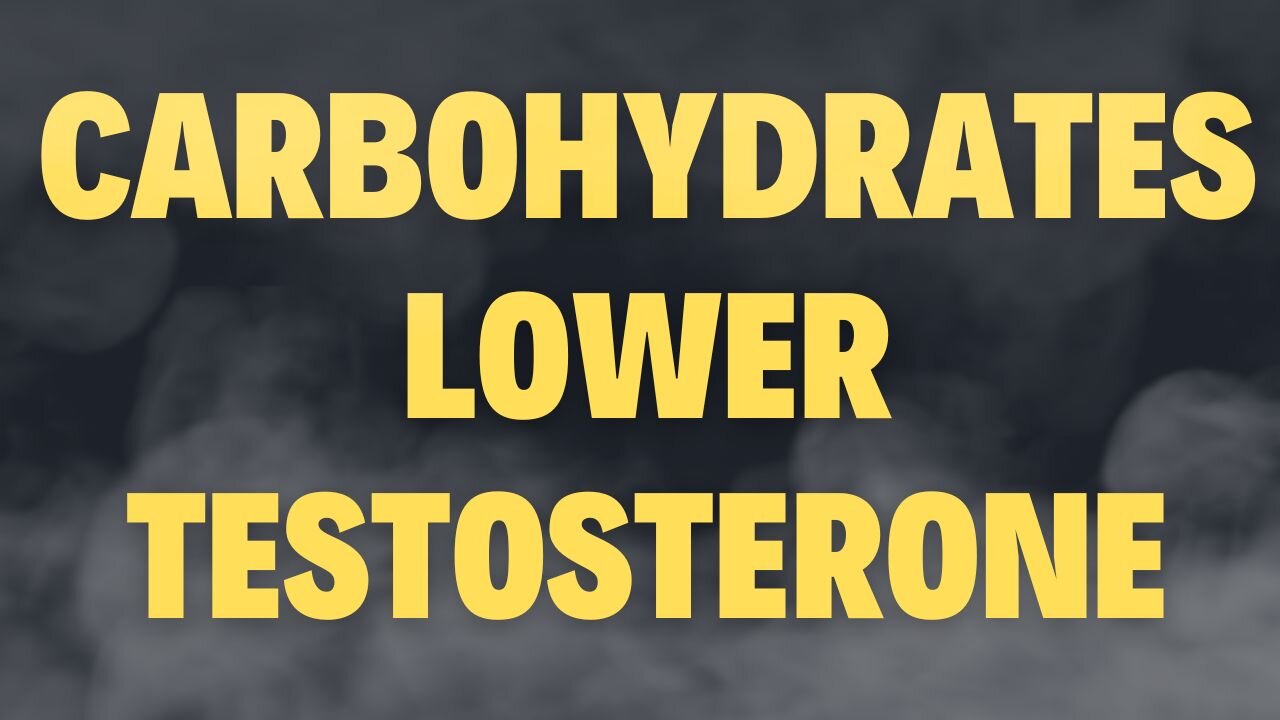Premium Only Content

Carbohydrates and Their Impact on Testosterone Levels: Raindrops1.com #testosterone #malehealth
Carbohydrates and Their Impact on Testosterone Levels:
An In-Depth Analysis
Carbohydrates are a fundamental part of the human diet, serving as the body's primary source of energy. They are found in various forms, from simple sugars to complex starches and fibers. While carbohydrates are essential for energy production and overall health, emerging research suggests that they may also influence hormone levels, including testosterone. This article delves into how carbohydrate intake can potentially lower testosterone levels, exploring the underlying mechanisms and implications for health.
The Role of Testosterone
Testosterone is a crucial hormone in both men and women, although it is more prominent in males. It is responsible for numerous functions, including:
Muscle growth and strength: Testosterone promotes protein synthesis, which is essential for muscle development.
Bone density: It helps maintain bone health and density.
Mood and cognition: Adequate testosterone levels are linked to better mood and cognitive function.
Sexual health: It plays a significant role in libido and reproductive health.
Carbohydrates and Hormonal Balance
The relationship between carbohydrate intake and testosterone levels is complex and influenced by several factors, including the type and amount of carbohydrates consumed, overall diet, physical activity, and individual metabolic responses.
Insulin Response and Hormonal Shifts
Consumption of carbohydrates, especially refined sugars and high-glycemic index foods, leads to a rapid increase in blood glucose levels. This spike prompts the pancreas to release insulin, a hormone that facilitates the uptake of glucose into cells for energy or storage as glycogen. While insulin is vital for energy regulation, chronic high levels can have adverse effects on hormonal balance.
Elevated insulin levels can suppress the production of sex hormone-binding globulin (SHBG), a protein that binds to testosterone and regulates its bioavailability in the bloodstream. Lower SHBG levels result in higher free testosterone, but chronic high insulin can eventually lead to insulin resistance. Insulin resistance is associated with higher body fat percentages, particularly visceral fat, which can increase the conversion of testosterone to estrogen via the enzyme aromatase. This conversion can reduce overall testosterone levels.
Impact of High-Carbohydrate Diets
High-carbohydrate diets, particularly those rich in refined carbohydrates, can lead to weight gain and increased body fat. Adipose tissue, particularly in the abdominal region, contains aromatase, which converts testosterone into estrogen. This process can significantly lower testosterone levels in individuals with high body fat.
Glycemic Load and Testosterone
The glycemic load of a diet refers to the overall impact of carbohydrate consumption on blood sugar levels. Diets with a high glycemic load can cause frequent spikes in blood glucose and insulin. Research has shown that men who consume diets with high glycemic loads tend to have lower testosterone levels compared to those who consume low glycemic load diets.
Inflammation and Oxidative Stress
High carbohydrate intake, especially from processed and sugary foods, can increase inflammation and oxidative stress in the body. Chronic inflammation and oxidative stress are known to impair the hypothalamic-pituitary-gonadal (HPG) axis, which is critical for the regulation of testosterone production. Disruption of this axis can lead to lower testosterone levels.
Practical Implications
Understanding the impact of carbohydrates on testosterone levels has practical implications for diet and lifestyle choices. Here are some strategies to manage carbohydrate intake and support healthy testosterone levels:
Choose Complex Carbohydrates: Opt for whole grains, legumes, vegetables, and fruits, which have a lower glycemic index and provide sustained energy without causing significant insulin spikes.
Balance Macronutrient Intake: Ensure a balanced intake of proteins, fats, and carbohydrates to support overall hormonal health.
Monitor Portion Sizes: Avoid excessive consumption of carbohydrates, particularly refined and processed varieties.
Maintain a Healthy Weight: Regular exercise and a balanced diet can help manage body fat levels and reduce the risk of insulin resistance.
Limit Sugary Foods and Beverages: Reducing intake of sugary snacks and drinks can help stabilize blood glucose and insulin levels.
Conclusion
Carbohydrates play an essential role in our diet, but their impact on testosterone levels is significant and multifaceted. By understanding how different types of carbohydrates affect hormonal balance, individuals can make informed dietary choices to support their overall health and well-being. Reducing refined carbohydrate intake, maintaining a healthy weight, and opting for nutrient-dense, low-glycemic foods can help maintain optimal testosterone levels and promote long-term health.
-
 LIVE
LIVE
Lofi Girl
2 years agoSynthwave Radio 🌌 - beats to chill/game to
249 watching -
 14:47
14:47
GritsGG
8 days agoRumble Tournament Dubular! Rebirth Island Custom Tournament!
114K6 -
 2:03:11
2:03:11
Inverted World Live
11 hours agoY2K 2.0 | Ep. 104
136K9 -
 2:02:53
2:02:53
Badlands Media
15 hours agoBaseless Conspiracies Ep. 149: Epstein Docs, Charlotte Stabbing, and Trump’s Next Moves
59.1K19 -
 2:56:12
2:56:12
TimcastIRL
9 hours agoTrump SLAMS Democrats Over Irina Zarutska Killing, Says WAR Over Chicago Crime | Timcast IRL
205K124 -
 29:08
29:08
Afshin Rattansi's Going Underground
1 day agoCol. Lawrence Wilkerson: World War 3 is ALREADY HERE, Netanyahu is INTENT on Greater Israel
29.3K27 -
 7:24:49
7:24:49
SpartakusLIVE
11 hours agoNONSTOP Snipes, Rockets, and BICEPS = Monday MOTIVATION
81.2K1 -
 6:31:35
6:31:35
Rallied
12 hours ago $4.21 earnedSolo Challenges All Day
65.6K2 -
 1:27:53
1:27:53
Flyover Conservatives
15 hours agoIs AI Actually Alien Intelligence? Dr. Jason Dean Exposes the Dark Side | FOC Show
56.9K9 -
 1:47:36
1:47:36
Glenn Greenwald
11 hours agoJD Vance and Rand Paul Clash on Due Process: War on Terror Echoes; Has the U.S. Given Up on Confronting China? Ben Shapiro's Latest Falsehoods About Israel | SYSTEM UPDATE #510
122K99